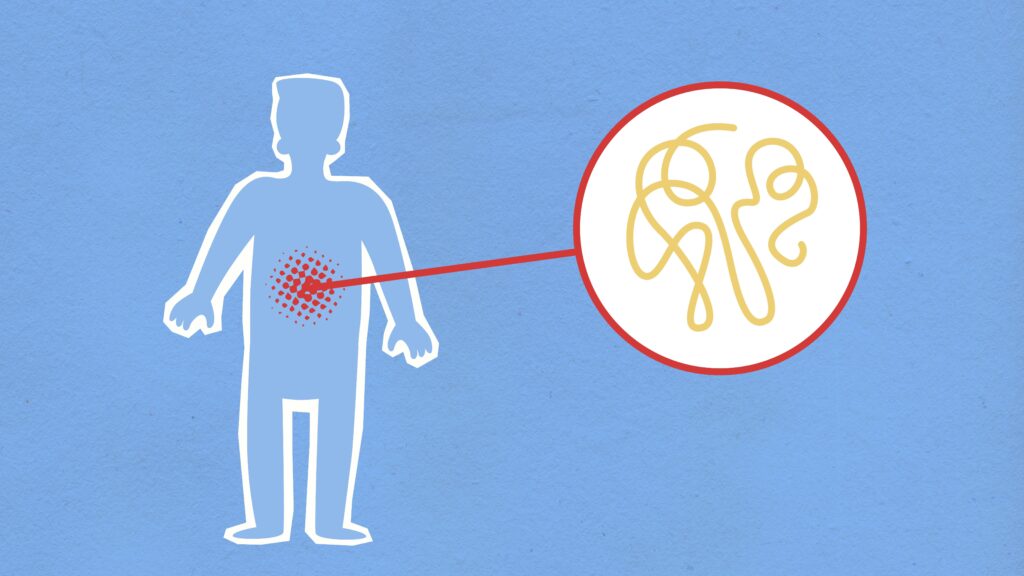A persistent cough can be inconvenient but usually will go away after a few days. Causes can vary from something as simple as ‘going down the wrong pipe’ to a mild infection like the flu or the common cold. Allergies or bronchitis could be the cause of a prolonged nagging cough if it persists for a week or longer. However, if the cough persists, there might be a slight cause for concern, but don’t burden yourself with panic. While a chronic coughing may could inidcate something as serious as cancer, there are usually less severe and more common reasons behind that nagging cough.
Anatomy Of A Cough

Firstly, an initial gasp draws air deep into the lungs as the cough initiates. The glottis snaps shut, closing over the windpipe, followed by an involuntary contraction of the muscles of the diaphragm and abdomen. As the glottis is closed, air cannot escape, leading to pressure build-up in the airways. The glottis swings open and the air rushes out at a tremendous speed, creating the whooping noise associated with a cough.
Coughs can occur voluntarily or involuntarily. The simulation of nerves in the larynx and respiratory tract begins with the cough in involuntary instances. Dust particles, smoke, stomach or nasal fluids can all cause irritation of the nerves in the larynx (voice box). Conscious or voluntary coughing occurs as a way to remove excess mucus or to clear the throat.
What’s Causing Your Nagging Cough?

Chronic coughs stem from many causes, from acute illnesses such as bronchitis and pneumonia to mild illnesses such as hay fever. It also affects millions of people globally and is one of the most common reasons for a doctor’s visit. Continuous chronic coughing disrupts sleep, affecting focus and producing fatigue. Lack of sleep can compromise the immune system, making the body vulnerable to infection. The physical consequences that could arise from chronic coughing include potential damage to ribs, fainting and urinary incontinence.
Asthma

The typical symptoms associated with asthma are wheezing and breathlessness. However, some patients with asthma just cough instead of wheezing. This cough-variant asthma affects up to 42% of chronic cough cases worldwide and often worsens at night. Cold air, exercise, allergens, and dust commonly trigger coughing episodes in affected patients.
Doctors diagnose cough-variant asthma through pulmonary function tests or by inhaling small amounts of methacholine, which induces wheezing in asthmatics. Anti-asthmatic treatment, such as inhaled corticosteroids like fluticasone or budesonide, can provide symptomatic relief. Short-acting bronchodilators such as albuterol also provide quick relief during acute episodes. Without proper treatment, 30-40% of patients develop classic asthma symptoms within years.
Smoking

Smoking is the leading cause of chronic cough development. Most cigarette smokers eventually develop a persistent “smoker’s cough” from chemical irritation. The toxic chemicals present in tobacco smoke damage tiny hair-like structures called cilia in your lungs. These damaged cilia cannot clear mucus and debris properly, leading to constant coughing. A smoker’s cough often worsens in the morning and produces thick mucus. The same harmful chemicals that cause this simple cough can also lead to serious diseases like bronchitis, emphysema, and lung cancer.
Post-Nasal Drip

Postnasal drip occurs when excess mucus from your nose drips down your throat. This mucus irritates your throat and consequently triggers a coughing episode. Your nose normally produces warm, sticky mucus to filter air before it reaches your lungs. However, allergies, infections, and irritants make your nasal membranes produce thin, watery mucus that drips backward.
Treatment starts with over-the-counter decongestants or antihistamines to help reduce mucus production. Steam inhalation from hot showers can aid in loosening thick mucus. Saline nasal solutions can help alleviate congestion by clearing the nasal passages. Consuming warm or hot liquids, soups or broth aid in keeping mucus thin. Sleep with your head elevated to prevent mucus from pooling in your throat overnight. These simple remedies often stop your persistent cough completely.
Gastroesophageal Reflux Disease

GERD or gastroesophageal reflux disease can trigger a chronic cough even without heartburn. Acid rising into your esophagus irritates nerves and sparks the cough reflex. Up to one-third of GERD patients lack pain but still cough or develop voice changes.
Begin by avoiding triggers like caffeine, chocolate, peppermint, garlic, onions, citrus, fatty foods, and alcohol. Eating small meals and staying upright for at least 2 hours after eating are preventative measures to avoid triggering reflux. Elevate your bed’s head by 6-8 inches or use a wedge pillow to keep acid down.
If a cough persists after 1 week, liquid antacids taken before bed might alleviate problems. After 2 weeks, add an OTC acid reducer such as famotidine or omeprazole. A 4-week trial often stops reflux cough; however, if symptoms persist, seek proper medical evaluation.
Chronic Bronchitis

Chronic bronchitis and bronchiectasis both trigger persistent cough through airway inflammation. Tobacco smoke and industrial pollutants cause chronic bronchitis by irritating the bronchial tubes. This creates excess mucus production and airway narrowing that leads to constant coughing. Bronchiectasis develops when inflammation permanently damages airway walls, making them thick and scarred.
Quitting smoking provides the most effective treatment for stopping further lung damage. Doctors prescribe corticosteroid inhalers combined with long-acting bronchodilators to reduce inflammation and open airways. During COPD exacerbations, symptoms worsen dramatically with increased cough, thick dark mucus, and severe shortness of breath. Treatment requires oral corticosteroids like prednisone plus antibiotics to fight bacterial infections.
Take Action Against Your Persistent Cough

Most chronic coughs respond well to simple treatments you can start at home. Do not panic if your cough lasts several weeks, but take it seriously enough to find the cause. Try treating common culprits like postnasal drip with decongestants or GERD with dietary changes and antacids. These approaches often stop your cough within days or weeks.
However, seek immediate medical attention if your cough produces blood, thick sputum, or comes with fever, weight loss, night sweats, chest pain, or severe fatigue. These warning signs require professional evaluation. Remember that most persistent coughs have treatable causes. Work with your doctor to identify the root problem and develop an effective treatment plan.
Disclaimer: This information is not intended to be a substitute for professional medical advice, diagnosis or treatment and is for information only. Always seek the advice of your physician or another qualified health provider with any questions about your medical condition and/or current medication. Do not disregard professional medical advice or delay seeking advice or treatment because of something you have read here.
